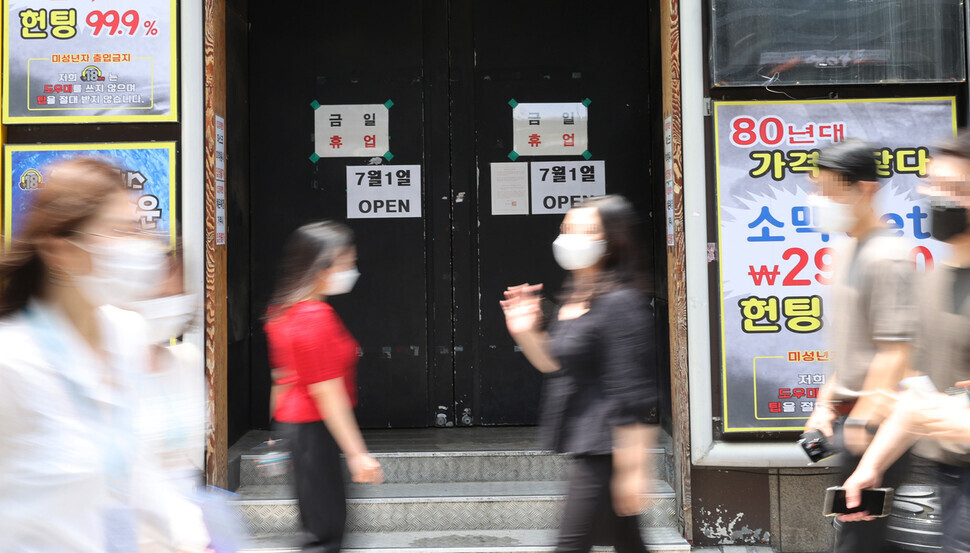hankyoreh
Links to other country sites 다른 나라 사이트 링크
Greater Seoul area accounts for 77% of COVID-19 cases in S. Korea

The South Korean government has begun to develop disease control measures in response to a recent resurgence in the number of confirmed COVID-19 cases in the greater Seoul area.
This appears motivated by concerns that a major spread of the virus in the capital region could have critics accusing it of acting inappropriately by implementing a new social distancing plan that loosens disease control restrictions.
According to statistics shared Monday by the Central Disease Control Headquarters (CDCH) on infections in different regions, the number of confirmed cases in the greater Seoul area has been steadily rising this month to account for nearly 80% of all domestic cases.
Weekly averages of daily domestic confirmed cases showed 66.3% of cases in the first week of June (1st to 7th) being diagnosed in greater Seoul. By the third (15th to 21st) and fourth (22nd to 28th) weeks, that rate had climbed to 75.1%, a rise of nearly 10 percentage points.
As of the start of the day Monday, the greater Seoul area accounted for 77.5% of all domestic patients testing positive the day before (366 out of 472).
At six, the greater Seoul area also accounts for the largest number of infection clusters nationally.
As of Monday, 58 people had tested positive in connection with a cluster involving restaurants in Seoul’s Mapo and Gangnam Districts. Another 124 confirmed cases had been recorded by the start of Monday in a cluster involving five different English afterschool academies in the Gyeonggi Province cities of Seongnam, Bucheon, Goyang, and Uijeongbu.
Twenty-two patients were diagnosed on June 19 in connection with a bar in Mapo, including six native speaker English teachers. From them, the virus spread to academy students and their family members and acquaintances.
The CDCH said the recent rise in domestic cases has centered on people in their 20s. According to the headquarters, patients in their 20s represented the largest segment among confirmed cases over the preceding week with a total of 636, or a rate of 9.3 per 100,000 people.
They also represented the age group experiencing the biggest rise, with cases jumping by 112 (21.4%) from the preceding week.
An examination of transmission pathways showed many patients in their 20s and 30s becoming infected through “multipurpose facilities” such as restaurants and nightlife establishments or through friends. In contrast, patients in their 40s and 50s were largely associated with cluster infections involving religious activities and workplaces.
Disease control authorities are not ruling out the possibility that the Delta variant of the virus may be affecting the transmission situation in greater Seoul. All four new clusters involving the Delta variant (37 patients) that the CDCH announced on Monday were reported in the greater Seoul region.
“The connection between the Delta variant and the nearly 80% rate of all confirmed cases being in the greater Seoul area is something that will require observation and analysis going forward,” said Park Young-joon, head of the CDCH epidemiological research team.
In response, the government decided to move up a scheduled Wednesday meeting of the Central Disaster and Safety Countermeasures Headquarters (CDSCH) presided over by the prime minister to Tuesday to discuss disease control measures for greater Seoul and other regions.
By Kim Ji-hoon, staff reporter
Please direct comments or questions to [english@hani.co.kr]

Editorial・opinion
![[Editorial] Penalties for airing allegations against Korea’s first lady endanger free press [Editorial] Penalties for airing allegations against Korea’s first lady endanger free press](https://flexible.img.hani.co.kr/flexible/normal/500/300/imgdb/original/2024/0502/1817146398095106.jpg) [Editorial] Penalties for airing allegations against Korea’s first lady endanger free press
[Editorial] Penalties for airing allegations against Korea’s first lady endanger free press![[Editorial] Yoon must halt procurement of SM-3 interceptor missiles [Editorial] Yoon must halt procurement of SM-3 interceptor missiles](https://flexible.img.hani.co.kr/flexible/normal/500/300/imgdb/child/2024/0501/17145495551605_1717145495195344.jpg) [Editorial] Yoon must halt procurement of SM-3 interceptor missiles
[Editorial] Yoon must halt procurement of SM-3 interceptor missiles- [Guest essay] Maybe Korea’s rapid population decline is an opportunity, not a crisis
- [Column] Can Yoon steer diplomacy with Russia, China back on track?
- [Column] Season 2 of special prosecutor probe may be coming to Korea soon
- [Column] Park Geun-hye déjà vu in Yoon Suk-yeol
- [Editorial] New weight of N. Korea’s nuclear threats makes dialogue all the more urgent
- [Guest essay] The real reason Korea’s new right wants to dub Rhee a founding father
- [Column] ‘Choson’: Is it time we start referring to N. Korea in its own terms?
- [Editorial] Japan’s rewriting of history with Korea has gone too far
Most viewed articles
- 160% of young Koreans see no need to have kids after marriage
- 2Months and months of overdue wages are pushing migrant workers in Korea into debt
- 3[Editorial] Penalties for airing allegations against Korea’s first lady endanger free press
- 4Historic court ruling recognizes Korean state culpability for massacre in Vietnam
- 5Presidential office warns of veto in response to opposition passing special counsel probe act
- 6[Guest essay] How Korea must answer for its crimes in Vietnam
- 7Story of massacre victim’s court victory could open minds of Vietnamese to Korea, says documentarian
- 8Historic verdict on Korean culpability for Vietnam War massacres now available in English, Vietnames
- 9Bills for Itaewon crush inquiry, special counsel probe into Marine’s death pass National Assembly
- 10In rejecting statute of limitations defense in massacre case, Korean court faces up to Vietnam War a